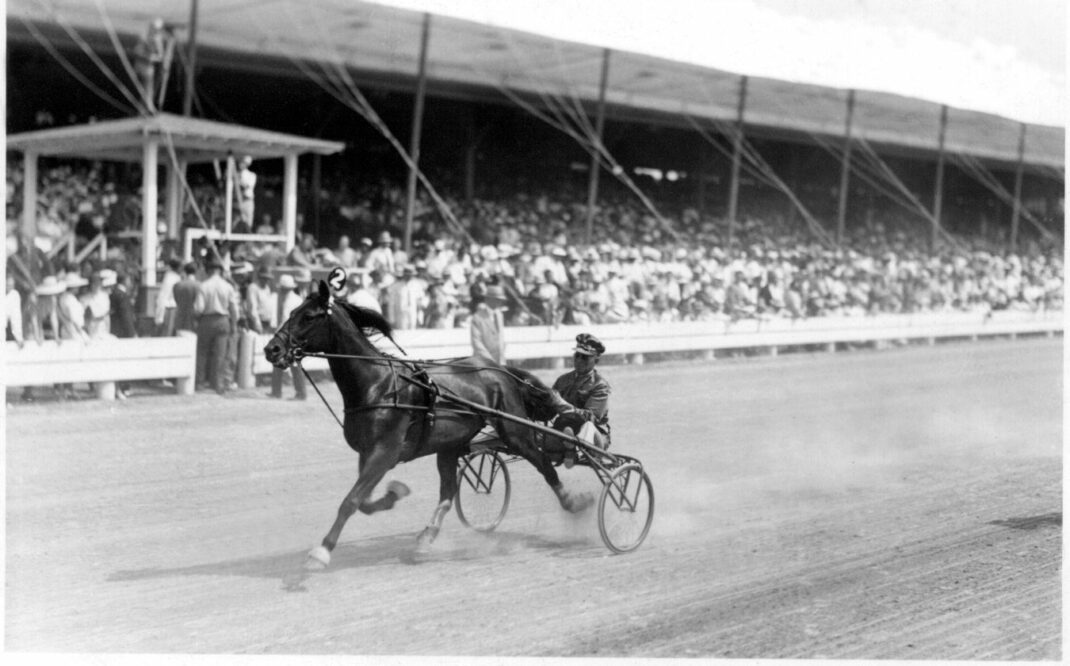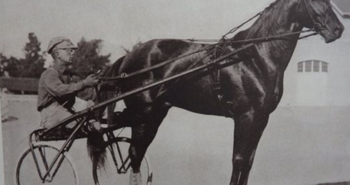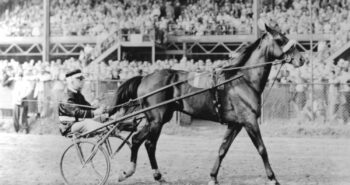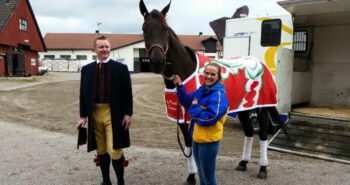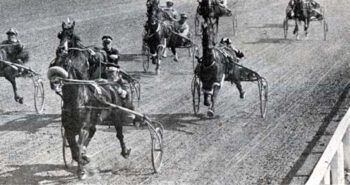Having won the Hambletonian twice, in 1930 with Hanover’s Bertha and 1937 with Shirley Hanover, the Hanover Shoe Farms’ Lawrence Sheppard had no obvious Hambletonian candidate in 1938. However, he got the success he wanted when he bought the winner shortly before the big race. McLin Hanover turned out to be a spectacular trotter – in fact so good he had to leave the continent.
Two weeks prior to the Hambletonian, Lawrence Sheppard’s best three-year-old was the Calumet Chuck-son Henry Boyd Hanover. He was, however, a bad-tempered and unpredictable trotter who, at best, was a real longshot in the big race. Sheppard wanted a “real” candidate and forked out $20,000 for the talented but inconsistent McLin on August 1, with the promise of another $5,000 if the colt won the Hambletonian.
After the purchase the horse was transferred from Walter Cox to Henry Thomas, but the latter had just nine days to prepare McLin for the Hambletonian. At 2, McLin had finished last in five races and his fastest mile was 2:13 1/2 (1.23,0), making him an unlikely future Hambletonian contender at the time. Wild breaks were to blame, but as the colt had demonstrated extreme speed he had been kept eligible in the big stakes. The following summer McLin started to show a lot of promise. In an article in the Cincinnati Enquirer on Jul 20, 1938, about the upcoming Hambletonian Stakes it said “a real outsider that many horsemen are seriously considering is McLin from the Good Time Stable, owned by WH Cane, promoter of the race. The son of Mr McElwyn – Ethelinda has yet to race, but he recently worked a mile in 2:04 1/2 (1.17,4) and that’s fast time for any horse trained by Walter Cox.” Just four days prior to the purchase, McLin had underlined his promise by winning a heat of the American Stake at Agawam, MA, but it was at the same time quite clear the antics from his two-year-season was still there as he made breaks in the other heats, including another heat when he went offstride looking like a sure winner with one-eighth to go.
An easy win
While buying McLin made a lot of sense to Sheppard, selling made just as much sense to his owner and breeder William H Cane. “But I couldn’t turn down $20,000. After all, he might not win the race,” Cane said after the sale. Prior to the race, McLin had won only one heat in his career (the aforementioned win in the American Stake), and had yet to win a race! So what better place to win your first race than the Hambletonian?
In the first heat, McLin moved out in front on the first turn and never looked back. The son of Mr McElwyn left his competitors in the dust and come home in 2:02 1/4 (1.16,0), six or seven lengths ahead of Earl’s Princess Martha and Royal Spencer. In the second heat, McLin drew the pole position as the result of his victory in the first. Henry Thomas and McLin were in full control for the whole race, jogging home to win in 2:02 3/4 (1.16,3) two lengths ahead of Champlain and Royal Spencer. In winning the Hambletonian, McLin earned $19,944.30, and repaid quite a chuck of his purchase price.
“He is not the trotter that Shirley was or is” said Sheppard after the win, “but I sure got a lot of contentment out of that victory. I was told that McLin was a good trotter but repeatedly broke stride. But you didn’t see him do that today, did you? Henry Thomas did a smart job handling him.”
From that point, McLin was the unquestioned star of the crop – and he would soon make a mockery of Sheppard’s claim that Shirley Hanover was the better of the two. A few days after the Hambo he was renamed and became known as McLin Hanover, as horses back then could be renamed after even they started racing. Even though he competed in the Hambletonian as “McLin”, it is common to refer to the 1938 Hambletonian winner as “McLin Hanover.” One week later, the renamed McLin Hanover won the second heat of the 2:14 trot at the Illinois State Fair Grand Circuit meeting in 1:59 1/4 (1.14,1). The time was he fastest for a 3-year-old trotter in a race and best second heat by a three-year-old trotter; Protector had earlier trotted the same time in the second heat of the 1931 Kentucky Futurity, while the fastest time for the age group was Dean Hanover’s 1:58 1/2 (1.13,6) time trial.
A brilliant exhibition of trotting
At Indianapolis on Sept 6, McLin Hanover won the Horseman Futurity – but not without reverting to his old self in the first heat. There he finished sixth after, according to reports, “acting up” as he made a break on the first turn and again on the upper turn of the track. Although officially known as “McLin Hanover” now, several newspaper reports hadn’t gotten used to the name and wrote that the race was won by “McLin”.
Ahead of the Kentucky Futurity the race was played up as a showdown between McLin Hanover and Long Key. The first heat was tight but McLin Hanover won by a nose. In the second heat Sheppard’s star three-year-old yet again broke early and, in the words of The Evening Sun, “found himself trailing half the field and well bottled up at the first turn. Then began the start of a brilliant exhibition of trotting and driving as McLin Hanover, under the expert reining of Henry Thomas got back on the trot and looked for an opening … The field moved around the lower curve of the track and as the trotters neared the beginning of the back stretch Thomas sent the Hanover colt from sixth to fourth position. Moving down the back stretch, McLin Hanover overtook Dale Hanover, Vesta Hanover and Long Key to gain the lead at the half mile post … From there on, it was a battle to the finish. Long Key, driven by Ben White, seven-time winning driver in the 3-year-old futurity was right beside McLin Hanover entering the home stretch, but could not overtake the fast colt, which held a half length margin as the horses flashed past the finish line.”
Despite the break, McLin Hanover won the second heat in 2:00 3/4 (1.15,0).
A threat to his favorite
In the second heat of the Kentucky Futurity, McLin Hanover had trotted the final quarter in 28 1/2 seconds (a 1.10,9 kilometer rate) and it was clear the Mr McElwyn colt possessed incredible speed. The obvious question was now: could he beat Dean Hanover’s world record? Almost everybody thought so. Unfortunately for McLin Hanover’s legacy, so did his owner Lawrence Sheppard – as Dean Hoffman explained in his book Quest for Excellence: “Here was a horse with such incredible speed that he could easily become the fastest three-year old trotter in history, and Thomas wanted to give the cold that chance in a time trial. ‘I think McLin Hanover would have trotted in 1:57 (1.12,7) or better,’ estimated Dick Thomas many years later. ‘His speed was unbelievable. He trotted eights in 13 1/2 seconds (1.07,1-tempo). It was Hanover’s practice to time trial everything in the stable when they got to Lexington.’ Everything, that is, except McLin Hanover. Lawrence Sheppard decreed that there would be no time trial for McLin Hanover. He would have beaten Dean Hanover’s 1:58 1/2 (1.13,6) world record so far it would have been funny, claims Thomas. But Dean Hanover was Shep’s all time favorite. No father would want to take his daughter’s name out of the record books after only one year. Besides, Sheppard already had a stall in the Hanover stallion barn for Dean Hanover and wanted him to keep his world record. No horse, certainly not even a Hambletonian winner like McLin Hanover, would ever usurp Dean Hanover’s spot in Lawrence Sheppard’s heart.”
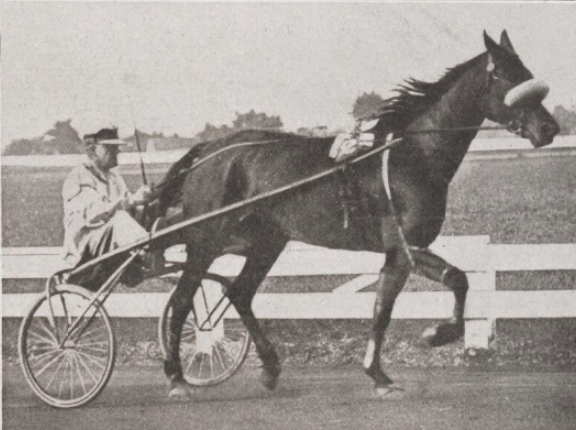
In fairness, it wasn’t a surprise that McLin Hanover was such an exceptional trotter. His sire Mr McElwyn was an exceptional trotter, but his dam Ethelinda wasn’t too bad either. Trained and driven by Walter Cox, Ethelinda 2:02 1/4 (1.16,0) was a classy racemare won the 1923 Kentucky Futurity. After that win, the daughter of the Peter the Great and Ethel Volo 2:29 3/4 (1.33,0), set a world record for three-year-old fillies when she trotted 2:02 1/2 (1.16,1) against time. She followed up at four and tied the world record for four-year-old fillies when she won in 2:02 1/4 at Columbus.
Ethelinda was sold to Charlie Mills in Germany in Oct 1936. She was then in foal to Mr McElwyn and carrying a full sister to McLin Hanover. The following year the filly Ethik was born. Ethelinda had two more foals in Germany, the 1939-filly Ethelka, by Sturdy, and the 1941 colt-Ethawa, by Walter Dear. The latter became a stallion after the war, though without a big impact. Ethelinda was one of the horses stolen by Soviet soldiers from Mills’ farm at Staffelde, just outside of Berlin, in those chaotic days in May 1945 when Walter Dear and other stars were also taken. Her fate is unknown.
Off to Europe
In the beginning of Oct 1938, Lawrence Sheppard sold McLin Hanover for $25,000 to Count Paolo Orsi Mangelli, commonly known as “the father of Italian trotting” and owner of the famous Orsi Mangelli farm in Italy. One can only wonder how he would have produced had Lawrence Sheppard kept him at Hanover instead of selling him to Europe. While it is impossible to say to know exactly what Sheppard was thinking, it sure seems he did not want McLin Hanover around at all and was very happy to sell him to Europe.
Mangelli put his new star in the training of Alexander Finn and the US import raced for two seasons in Europe. In 1939 McLin Hanover won several big European races including the Matadoren-Rennen in Germany, won in a record 1.17,0 (2:03.1) time – a race record that would stand for 21 years – and the Campionato Europeo in Cesena. The following year he combined stud duty with a few races and won the Gran Premio d’Inverno. However, it’s obvious that WWII hindered McLin’s legacy – had European been peaceful he surely would have been an obvious candidate to win the Prix d’Amerique and numerous races both in France and elsewhere in Europe.
At stud he proved an excellent stallion. He sired two winners of the Italian Derby and five winners of the big three-year-old race Gran Premio Orsi Mangelli, as well as numerous other classic race winners. One of these was Rialto, whose dam The Dutchess also started in the 1938 Hambletonian as the first European-owned horse. Rialto, a brilliant trotter, won both the Italian Derby and the Gran Premioe Orsi Mangelli in 1948. McLin Hanover was moved to Germany ahead of the 1959 breeding season and stood stud there for a few seasons.
McLin Hanover
Bay colt born in Goshen, NY in 1935. Died in Germany in 1961.
Mr McElwyn – Ethelinda (Peter the Great)
1:59.1 (1.14,1)
Breeder: Good Time Stable
Owners: Good Time Stable – Lawrence Sheppard – Orsi Mangelli
Trainers: Walter Cox, Henry Thomas and Alexander Finn
Drivers: Walter Cox, Henry Thomas and Alexander Finn
Groom: –

